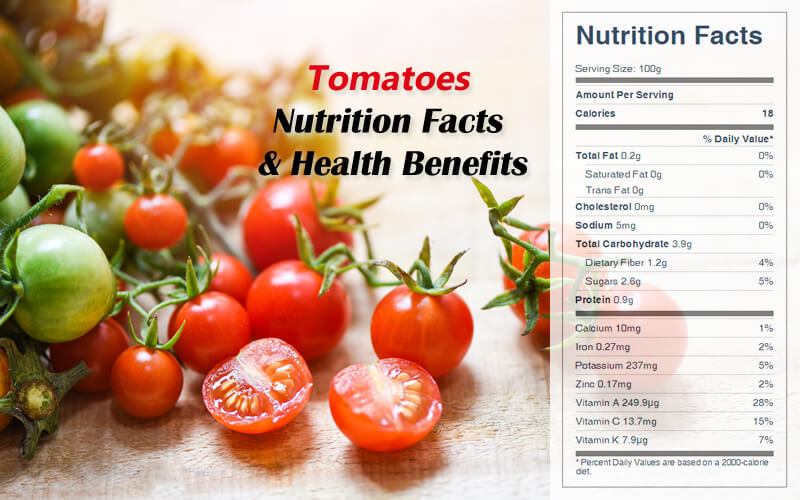Tomatoes Nutrition Facts & Health Benefits
Tomatoes are a miracle fruit and vegetable combination, grown and eaten around the world. Tomatoes are fortified with health-promoting phytochemicals. Here are the nutrition facts and health benefits of tomatoes.
A tomato is 95% water, contains 4% carbohydrates and less than 1% each of fat and protein. The phytonutrient compounds in tomatoes include flavonoids, carotenoids, and vitamins such as ascorbic acid and vitamin A. The lycopene and beta-carotene provide the antiinflammatory activity in tomatoes.

Raw Tomato Nutrition Facts Label
Health Benefits of Tomatoes
Tomatoes are one of nature’s best sources of lycopene. Tomatoes help to reduce inflammation and have a high antioxidant content. Cooking tomatoes makes the lycopene more available, but that doesn’t mean you need to avoid raw ones. One cup of raw tomato still provides plenty of lycopene, as well as lutein, vitamins A and C, carotenes, anthocyanins, and potassium. Cooking the tomatoes fortifies the lycopene content, making it more bioavailable.
The lycopene in a tomato gives it a powerful protective role in human health as well as its red color. As the tomato ripens and matures, the flavonoid content accumulates.
It is the lycopene, however, that has made tomatoes a superfood. It may be the best substance for quenching oxygen free radicals, and it helps protect the skin from the aging effects of ultraviolet light. Lycopene has been researched for its potential in combating several types of cancers, including prostate, breast, pancreatic, and intestinal cancers. Interestingly, however, in some studies lycopene alone did not convey the same protection as eating a diet rich in tomatoes. So there are certainly more health-protecting treasures inside this versatile food.
Tomatoes are also low in sodium and rich in potassium, making them good for conditions such as high blood pressure and fluid retention.
A ripe tomato contains more than 200 volatile compounds that make up its unique taste and smell. Green tomatoes contain a chemical called tomatine, which may trigger migraine attacks if you’re a sufferer. Tomatine is destroyed by cooking but remains in quite high amounts in pickled green tomatoes.
Carotenoids modulate the immune response, stimulate signaling in our cells between pathways, and possess provitamin A activity. These alpha- and beta-carotenes serve as a precursor to vitamin A. Vitamin A is a key micronutrient to immune tolerance in the gut. Vitamin A is required for innate and adaptive immunity, enhancing the antibody response, and maintains and restores the integrity and function of all mucosal surfaces.
Tomatoes are very rich in antioxidants, especially beta-carotene and lycopene. This makes them good for the cardiovascular system. Research shows that they may also help to prevent some forms of cancer, particularly prostate cancer. In the largest study to date, it was evident that eating four portions of tomato sauce weekly reduced prostate cancer risk by 35 percent. Although lycopene may be useful as a supplement, research shows that when tomato products are cooked and combined with oil, the lycopene is more biologically available—so pills aren't a substitute for the real thing. There are other plant chemicals in tomatoes that are also cancer-protective. A study in 2007 found that broccoli and tomatoes together were better at fighting prostate cancer than either vegetable was alone.
Studies have shown the consumption of tomatoes results in a reduction of pro-inflammatory cytokines secretions, specifically pro-inflammatory cytokines IL-8 and tumor necrosis factor-alpha (TNF-alpha), but an increase in the release of IL-10, an anti-inflammatory cytokine. These proinflammatory cytokines contribute to a chronic state of inflammation in the body. Because we are constantly exposed to inflammatory material, we want to balance that with antiinflammatory cytokine release. Tomatoes have also been found to inhibit the production of reactive oxygen species, which is why they have antioxidant properties.
The fiber and antioxidants in tomatoes have been shown to lower cholesterol levels and stabilize blood sugar levels. A high dietary intake of tomato products significantly reduced both low-density lipoprotein, and total cholesterol levels, while making the cholesterol less vulnerable to oxidation.
Health Tips
Tomatoes come in all shapes and sizes. Choose tomatoes that have the deepest color, with a smooth skin that has no cracks or holes.
Tomatoes keep best unwashed at room temperature and out of direct sunlight. It is not recommended to refrigerate them as this can harm the flavour. Tomatoes stored cold tend to lose their flavour permanently.
Storing stem down can prolong shelf life, as it may keep from rotting too quickly.
Tomatoes that are not yet ripe can be kept in a paper bag till ripening.
Lycopene is fat soluble, so it is more bioavailable if you eat your tomatoes with a little fat, such as olive oil or cheese. If you’re trying to eat broccoli with your tomatoes, try an omelet filled with broccoli and tomatoes cooked in olive oil.